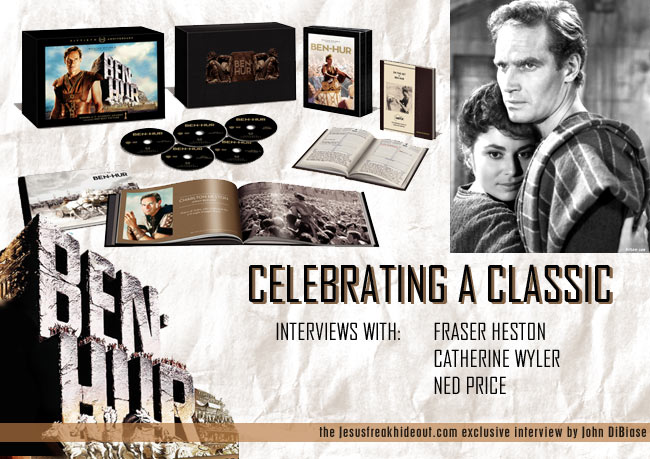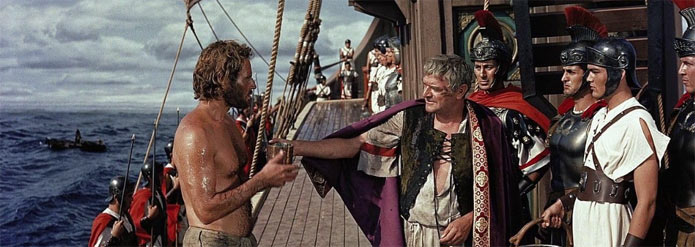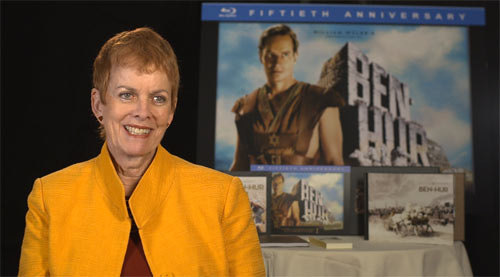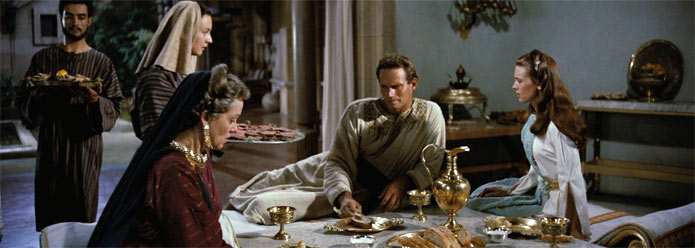
Fraser Heston: Thank you very much.

Fraser: Well, I got involved with this project when Warner Bros. came to me and asked if I would be interested helping to produce a documentary about my father. That became "Charlton Heston and Ben-Hur: A Personal Journey," which is the name of our feature-length documentary that is included with the Blu-Ray set now. So it gave us an opportunity to use a lot of archival material that we had, including three long reels of 16mm film footage that my mom, Lydia Clarke, took on the set of Ben-Hur, from behind-the-scenes, in our villa in Rome and at home after we got back. So it gave us a chance to use those assets in a way that I think tells a wonderful story of how did Ben-Hur affect my father's life, what was his life like with the family in Rome - not the part that you see in front of the camera, but the part that you see at home and behind-the-scenes. So it gave us a chance to kind of make that story happen, and it was a wonderful experience.
As far as the restoration of the film goes, I wasn't brought in until it was almost completed. I went to visit at Warner Bros. at the lab where they were doing it and they showed me some of it. It was just extraordinary. It just blew my socks off. It looks like you can step into the film with the actors and jump into the chariot and ride off. It's great.
Fraser: Well, I think Ben-Hur affected us profoundly and to the good, obviously. Dad felt that he had not quite achieved a level of the sophisticated actor that is taken seriously as an artist - not just as a blockbuster hero like someone who does a C.B. DeMille epic, and he loved Ten Commandments and was thrilled to work with C.B. DeMille, by the way, and that's a marvelous film, but Ben-Hur was a different line of country. It was probably the first modern epic. And, of course, going into it, Dad had no idea whether it was going to succeed or whether he was going to be any good in it. And there were doubts and fears and second thoughts. William Wyler came to him halfway through the show and said, "Chuck, you need to be better in this part. I don't know how to tell you to do that, but you need to dig down deep and find that character within you and bring that out." And Chuck went "Wow, that's scary!" But it was the right thing to say to him at that time. And it got him motivated and he did dig down deep and, of course, both he and Wyler won an Academy Award.
Fraser: Well, the chariot race scene for me just blows me away. You've got a scene that goes on for five or ten minutes - with no music, by the way - and there's almost a one or two minute introduction of the parade of chariots around the ring - and no dialog! Nobody's explaining what's happening, you don't need a word. It's a great piece of filmmaking. It's like a mini-movie itself.
Fraser: One of my first memories is riding around the ring in my dad's chariot. And we have film footage of that. I think I imagined my dad was a professional chariot driver at that time.
Fraser: Y'know, the film does have a spiritual impact. I think the most profound impact, in a way, was on my dad. The very last scene they filmed was the last scene in the picture - which isn't always the case. As you know, we mix and match the scenes to fit the budget and the schedule. In this case, the crucifixion of Jesus was the final sequence in the film and dad basically lost it. And he's not supposed to be in tears, but practically was and you can see it in his face looking up at this very realistic recreation of Golgotha. Although Ben-Hur is a Jew, like Jesus, he becomes one of the first Christians, in a way. You can say "no, he stays true to his Jewish faith," which is fine. Whatever your interpretation is, but certainly the message is a Christian one. And I think that profoundly affects a lot of people who watched it, including my dad.
Fraser: I just completed a film called The Search For Michael Rockefeller, which is a documentary that also uses some old 16mm footage that we found, taken by a man named Milt Machlin, who went to New Guinea looking for Michael Rockefeller who disappeared in 1961.
Fraser: It's in film festivals now.
Fraser: No, the "Ben-Hur knockers" as we call them, have the Star of David on them and are proudly displayed in my father's study. That was his main [keepsake] - that and a lot of memories.
Fraser: No! I wish I did. I think the Wyler kids, David and Melanie, kept theirs. I don't know what became of that stuff.
Fraser: Did you? Oh, I'm so glad! Because we were a little uncertain whether we wanted to do it or not and I thought, "Y'know, he would want us to put them in there." There was nothing in any way too private or too personal.

Catherine Wyler: Well, you know he had a great reputation for being a perfectionist and he was definitely a perfectionist at home also, so a great deal was expected. But he also was really fun. He liked to play, he was very funny, he was a great storyteller, obviously. And he was very politically committed. So he was fun and interesting to be around and I always just liked him a lot. And, at the same time, as I learned about what he did, I think my impression of him mostly came from how other people treated him. Because there were a lot of famous people coming and going from the house, but they always seemed to be treating him with so much respect and sometimes even awe. It was hard to know as a kid how to take that. But he was obviously someone to be respected. Although, I was the eldest child and the eldest, generally -- like wearing lipstick, for example, was a really big struggle. He did say to me once, "the most beautiful women in the world ask my opinion, why won't you??" *laughs* I was a teenager.
Catherine: Oh yeah, sure. Well, my whole family went to live in Rome because they were there for more than a year, but I was in college, so I was only there for summer vacation, but we went to the set a lot because the all the sets were so fabulous. I mean, everything that was going on was so fascinating! It was a lot of fun to be there.
Catherine: Yeah, my favorite memory is riding around on the back of his vespa. Y'know, these were the biggest sets ever made, so he had a vespa take him around and I would sit on the back of the vespa and just listen in on what he was telling people, what was going on, etc - which was really interesting.
Catherine: Well, I think it meant - once it was done and it was successful - it meant that he could make a big epic and make it good! And he'd always been interested in making all kinds of movies, he hadn't made an epic yet, and so he sort of showed himself that he could do that too. Because it was far outside the realm of the kinds of movies he was usually interested in. And then it meant great success in Hollywood, at the same time that it also meant that his standing among the critical community took a nose-dive, because he was kind of written-off as just a commercial director, not really serious anymore if he's going to make a movie like that. So I think he was really rather hurt by that treatment, but that seems to have dissipated over the years.
Catherine: And not only that, it was two things, really. I think it was that he made what they consider a Cecile B. DeMille picture, and even though he made it more three-dimensional and profound, etc, still, and then also it had shortly thereafter became the era of the Otur, and he firmly believed that the director should tailor the style to the story as opposed to having a style that stood out. He felt the director's work should be visible. So all those things hurt him, critically for awhile.
Catherine: I'm actually working on getting a new documentary on my father made using contemporary directors talking about how he influenced them, because there are a lot of people who are working today who do think back to what they learned from him. The other thing I'm working on in terms of him - we've got a website, which we haven't really done anything with for a long time and I want to get that to have a contemporary feel and have lots of material and links and all the things that you can do with the web nowadays. That'll have an even bigger reach than a documentary.
Catherine: Well, another milestone in my father's career, I suppose. It meant wonderful trips to Rome and I think it meant him being celebrated in more places. It was all good.
Catherine: I have a lot of favorites. But of course Wuthering Heights is the film that I was named for, so that's got to be a favorite. But if I start naming my favorites, I've got about ten, so I'll say Wuthering Heights, Best Years of Our Lives, which I think is really his masterpiece, and certainly Ben-Hur.

Ned Price: Well, the sales division for Home Video called me up and they said "Look, if we're going to release Ben-Hur again, what will it take to make it marketably better for this market?" Because, every time they re-release a title, you have to really raise the bar in order to expect people to shell out the money again to buy it. So I usually go to the drawing board and create some tests for them, do some scanning and then show them. I'll say, "I can probably make it 70% better, but it's going to cost you X about of money and I'll need 10 months," or something like that. And then they weigh it and say "Uh, OK, can you do it in 6 [months]?" and I go "No, no, no." *laughter* So that's what it basically is. In this case, it's a market request coming through and saying "We want something that will knock their socks off, but what will it take for you to accomplish that?" And there have been cases where they come to me and say "We want to re-release this title, what will it take to make it amazing?" And I'll say "Y'know what? The last master's really good and you'll spend X amount of money and I'll get 20% better" and they go "Oh... OK." Or I'll go to them and they'll say they want a title and I'll do my investigation and testing and say "Y'know, this title needs a lot of help and it's going to cost you this much money and it's going to take a year and a half to do it." And then they say "Um...... alright." *laughs* And they go ahead and do it. But it's a bartering thing. I like the fact that it's a challenge. They'll come to me and say "What is it you can do? What can be accomplished?" They don't just say "do it again so we can put it out again." They are sort of conscientious about what they are trying to achieve for the market and the consumers.
Ned: Yes.
Ned: Very much so, because we had worked on Ben-Hur; we worked with the camera negative original ten years ago and found that it had a problem. Somebody had applied a coating to the negative and we couldn't remove it. It was synthetic and it had bonded in. So we had a problem because I knew we had to revisit that negative and I knew we had to apply digital technology in order to literally strip away that opaque residue and get at the image underneath.
Ned: No frames lost in our process. There were frames lost that you will notice in the film that were usually a case of the film being so heavy and, y'know, you've got the perforation transport, sometimes what happens is a perf gets picked - they refer to it like an edge lifts up - and typically, next time it goes to the printer, the printer will pull a tear in it. And if it rips a frame across, in order to repair that frame, in the traditional film world, you have to make a clean slice. So you will notice one frame may be missing here and there. There were some cases where we did morph the missing frame, but there were a number of cases where we didn't because the morph looked more intrusive. So there are a couple visible.
Ned: Believe me, it's the better of the two. The fix didn't look good at all.
Ned: It probably took a couple of years, because there was a lot of technology work, software work that happened; a lot of prepping of the negative before it was even in a position to be scanned. And of course the 8k scans took a long time. We never have worked on a project that was [this big]. I think it was 117 megabytes per frame.
Ned: Well, we scanned it at 8k and it was a 65 original, so it was quite a large field.
Ned: For Home Video, they like to reveal what titles are coming out, so I don't want to ruin their surprises. We've got some really nice titles in the work. I think you'll be pleased.
Ned: I'm making a very conscious attempt of finding elements that are not in our library - titles we don't know we own, which is actually possible that this can happen. There's a case with a series of westerns. I saw the line of westerns and I'm going through and I'm kind of researching them and all of a sudden, a year's worth of westerns are missing. I said, "How do we not own these? We own the rest of them?" And then I went to the legal department and they pulled the originals, and these go way back, and they said "There's a page missing from the agreement. It fell out." So it didn't get entered into our inventory. So, we own them and the negatives were found. That's where I'm focusing.
Ned: They'll be preserved for any distribution anybody wants.
 Mat Kearney Announces "Nothing Left To Lose" 20th Anniversary Tour Mat Kearney Announces "Nothing Left To Lose" 20th Anniversary TourWed, 04 Mar 2026 19:10:00 EST |
 We The Kingdom Celebrates RIAA Gold Certification of "God So Loved" We The Kingdom Celebrates RIAA Gold Certification of "God So Loved"Tue, 03 Mar 2026 18:40:00 EST |
 Mary-Clair Attends Lionsgate's "I Can Only Imagine 2" Premiere Mary-Clair Attends Lionsgate's "I Can Only Imagine 2" PremiereTue, 03 Mar 2026 18:30:00 EST |
 Stand41TrueGod to Release New Single "Wilderness" on All Platforms March 13 Stand41TrueGod to Release New Single "Wilderness" on All Platforms March 13Tue, 03 Mar 2026 18:20:00 EST |
 Alex Henry Foster Opens 2026 with Cruise Performance as New Album Nears Completion Alex Henry Foster Opens 2026 with Cruise Performance as New Album Nears CompletionTue, 03 Mar 2026 17:50:00 EST |
 Museum of Christian and Gospel Music Receives Designation as Site on U.S. Civil Rights Trail Museum of Christian and Gospel Music Receives Designation as Site on U.S. Civil Rights TrailTue, 03 Mar 2026 17:30:00 EST |
 Point of Grace Unveils "Lady Wisdom" March 27 Point of Grace Unveils "Lady Wisdom" March 27Mon, 02 Mar 2026 20:00:00 EST |
 Click here All News Headlines |
Click here All News Headlines |